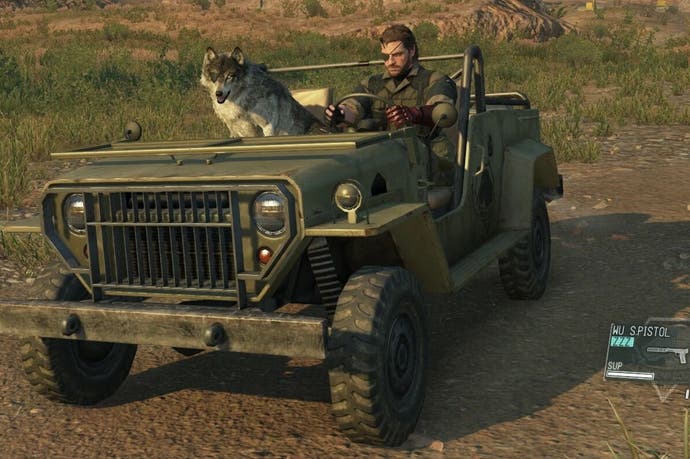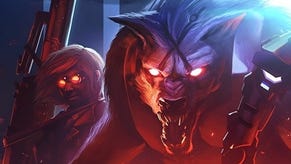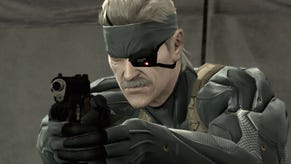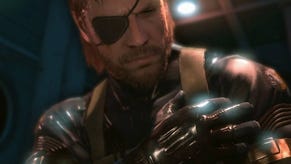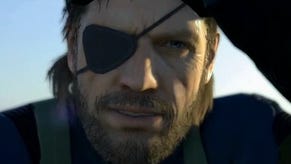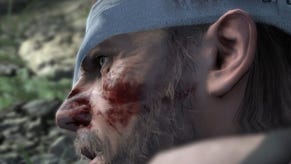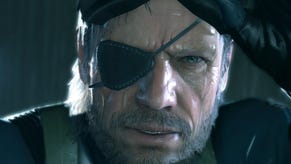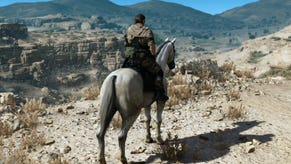Metal Gear Solid 5: A phantom battle waged by the vanished
A brave new world.
Hideo Kojima's name may not be on Metal Gear Solid 5: The Phantom Pain's marketing, but it's all over the game. Every mission opens with a credits sequence overlaying its intro with Kojima's name popping up at least once once each time. Perhaps it's a jab at Konami, though maybe it's the sort of ego-stroking flourish his employers grew weary of. Regardless of your take on the corporate domestic dispute, the message is clear: with The Phantom Pain we're clearly back in Kojima town.
And I, for one, couldn't be happier. Last year Metal Gear Solid: Ground Zeroes gave us a look at how an open-world Metal Gear Solid would work, and so the moment to moment feel of infiltration, scouting and action shouldn't come as a surprise to fans, but its opening hour will. Without going into spoilers, I can say that it's no more interactive than the prologue to The Last of Us, only - in true Kojima form - it's about four times longer than Naughty Dog's harrowing opening.
Limiting the player to camera control and sluggish character movement for such a long time sounds like it would be boring - and indeed it may upon replaying - but it's a testament to Kojima's abilities as a pseudo-filmmaker that this peculiar prologue is never, ever dull. It doesn't necessarily make a lot of sense at first - nor does it 15 hours later, for that matter - but it's intentionally abstract in a way that makes it almost as bewildering for series veterans as it is for newcomers.
Once the prologue comes to a close the open-world adventure begins proper with the rocky desert plains of Afghanistan providing the playground from which to tackle an ever-expanding laundry list of missions and "side-op" sub-quests that make up the campaign. In many ways The Phantom Pain feels similar to other open-world stealth/action behemoths like Assassin's Creed and Far Cry - what with the former's third-person sneaking and the latter's jungle setting - but there are a couple of key differences that make Metal Gear Solid 5 stand out.
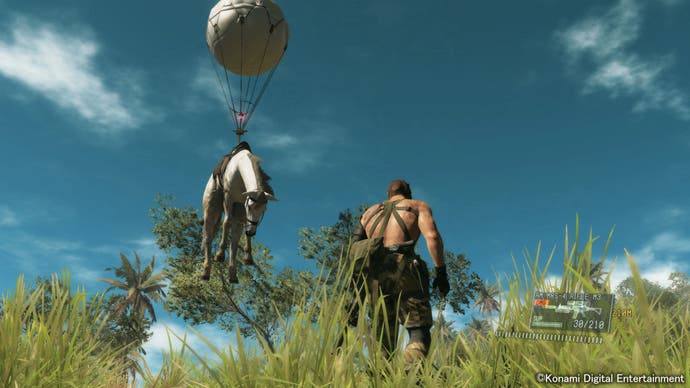
One is its complexity and control. There are far more gadgets and gear in Snake's adventure than there are in Ubisoft's major sandbox franchises. The series' iconic cardboard box is a fan-favourite, but you can also speed up time with the Phantom Cigar, lure foes with a magazine, call in an airstrike for the brute force approach, drag unconscious or dead guards into dumpsters, or plant C4 to blow up tanks and cause diversions. Even the combat feels expansive with the ability to ride horses and vehicles. Not every mechanic in The Phantom Pain is new, but it plays like a Greatest Hits anthology of all the features touted in other genre entries and delivers them with gusto and aplomb.
Another reason my 15 hours with The Phantom Pain trumped those in similar titles was the sheer amount of genuinely exciting secrets you can discover. It's filled to the gills with strange, wonderful things to find such as: a one-eyed dog you can recruit to help scout your surroundings, a bear you can capture for Mother Base's own zoo, or a series of catchy pop songs to add to your iDroid. Further Easter Eggs include a poster for Ground Zeroes and one of the radio recordings from P.T. playing in an enemy camp. They're joys to discover.
The more practical rewards are likewise a pleasure as you scavenge the field for resources that will bulk up your Mother Base. As we saw in Peace Walker, players can kidnap enemy soldiers via flying "Fulton Balloons" that whisk them away to the heavens (or Outer Heavens, as it were). From there your new recruits get automatically assigned to various departments like R&D, Intelligence, Medical, and Combat, though you can always shuffle them around should you wish. By fleshing out your forces you'll gain better gear like rocket launchers, sniper rifles, stronger Fulton Balloons for cargo extraction and more. You can even gather materials to help you build new platforms in your offshore base. This gives players further reason to scour every nook and cranny of the battlefield.
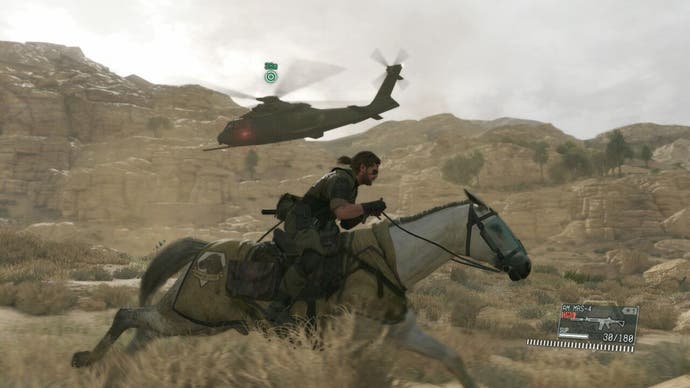
Unlike most stealth games where the entire gameplay loop is confined to avoiding detection, the Metal Gear series is known for its boss fights that mix and match their robust systems of sneaking, shooting, sniping, trap-laying, cover-seeking, and close-quarters combat. One side effect to The Phantom Pain's scale is that boss encounters seem fewer with further between them, at least in the game's opening hours. While I'd hate to spoil the surprise, I'll say that my encounter with the game's first true boss felt familiar, only more epic with seemingly random sandstorms shifting the dynamic in our deadly game of cat and mouse. Like previous games, there's an extra difficult option to drain their stamina instead of health, which is always an appreciated challenge for the Metal Gear elite.
Metal Gear Solid 5's lack of hand-holding is also a major boon above its competitors. There's a ton of variety in how to achieve your goals, giving players a much greater sense to express themselves than simply "sneak" or "shoot" your way through. Depending on the mission, a rescue target can be located by interrogating guards, retrieving documents, rescuing fellow prisoners, following a lead, or simply stumbling upon them through happenstance. It really gives you the feeling of being a spy infiltrating a base, rather than a coddled superhero sticking to a script.
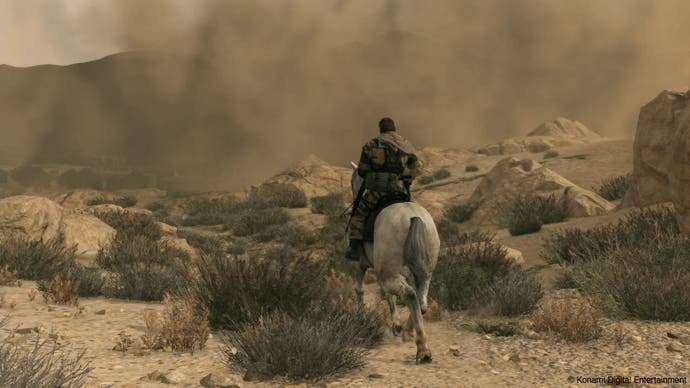
My time with Metal Gear Solid 5 ends upon struggling for roughly two hours with a particularly dastardly mission. Of the six fellow people I speak to who succeeded this quest, each one solves it differently. Some utilise AI companions, others find themselves in protracted shoot-outs involving multiple supply drops, another has upgraded gear offering an alternate solution, and someone else uses that airstrike option I keep forgetting exists. Sure, I fail this mission for ages, but it isn't the game's fault. It's my own.
There is one time where my failure does feel like poor design, however. One of the lengthier, more difficult missions ends with a chase as you try to shake your pursuer so your evac helicopter can snag you. Naturally, I whistle for my horse and book it for the hills. Suddenly, I'm given a warning that I'm leaving the mission area and this will abandon my mission. Before I even have time to react to this warning it's over: I inadvertently go AWOL and lose my last hour of progress due to misleading directions. When I voice this concern to a Konami rep, he tells me someone else did the exact same thing, so hopefully this will be amended before the game ships in September. On the plus side, in my 15 hours of playing The Phantom Pain I only encounter the "You are about to leave the mission area" warning twice, so it's not exactly a frequent occurrence.
The other downside to Metal Gear Solid 5's open-world is that the constant to-ing and fro-ing between mission starting points can drag, and the game's two fast travel methods aren't exactly fast. One allows you to call in a helicopter and escort you to a closer region of the map, but Landing Zones are few and far between and the chopper takes roughly a minute to land, another minute to pull out, and another minute still to deposit you at the new LZ. Alternatively, you can snag a shipping label from an outpost, place it on your cardboard box, and fool the enemy into delivering you. But most of the time you're best off hightailing it on your faithful steed, D-Horse. (What's the D stand for? Diamond? Deployable? Decoy? Either way, it's a D-light.)
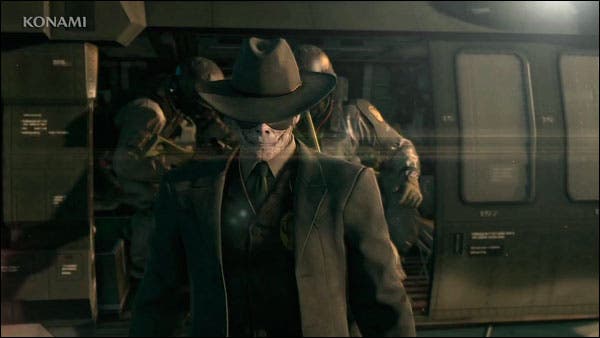
Open-world games, as a genre, tend to struggle with narrative momentum as they try to balance freeform gameplay with a more scripted story, and Kojima is known for his overstuffed sense of pacing, so it should come as no surprise that The Phantom Pain's storytelling largely takes a backseat to the emergent exploration. Some will find this disappointing as its structure feels more akin to a portable game like Peace Walker or Monster Hunter than that of a big budget numbered entry in the series. But this is a small price to pay for a deeper, more endlessly replayable experience.
Those who played Metal Gear Solid 5: Ground Zeroes will recall the public's disappointment upon hearing its campaign was only a couple of hours long followed by an elation in realising that this didn't matter. Ground Zeroes' single mission was bustling with alternate routes, secrets, and challenges that made its brief campaign almost endlessly replayable. The Phantom Pain is even more dynamic than that, with a real-time day/night cycle altering patrol routes, sandstorms and rain popping up seemingly at random, and enemy gunships scouting large areas of the map. Kojima has said that The Phantom Pain is 200 times the size of Ground Zeroes, and while much of that is relatively barren landmass, it's still several dozen times larger with an abundance of gadgets and playstyles to mess about with. Quite frankly, I'd be surprised if my playtime with The Phantom Pain doesn't stretch into triple digits by the year's end.
In any game of this scope nitpicks are bound to be abundant - a finicky checkpoint here, a poorly developed character there, or a disappointing cover of a classic tune elsewhere - but at the end of the day the truth is plain and clear: Metal Gear Solid 5: The Phantom Pain is the most fun stealth action game I've ever played. If this is truly Hideo Kojima's final Metal Gear game, and all signs suggest it will be, it's as glorious a swan song as we could have hoped for.
This article was based on a press trip to Los Angeles. Konami paid for travel and accommodation.
